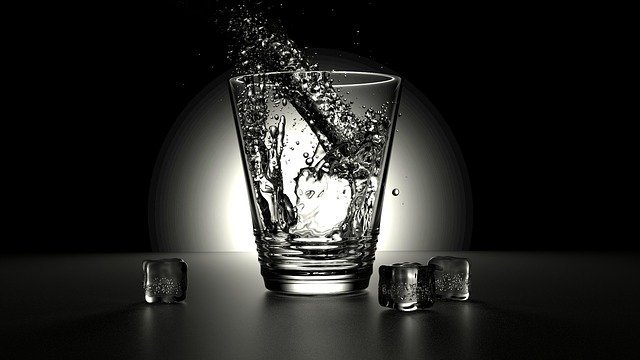
The most common misconception about our bodies is that they are made of water, but in fact, the water contained in our cells accounts for only ten percent of our body weight.
The rest is composed of “dry” minerals, salts and ions. Water itself cannot be stored by the body; it can only be produced from other substances – either ingested or produced by cellular metabolism.
When you stop drinking water, your body must find another source of the H 2 O it so desperately needs.
Most people believe that when they die their bodies will be found to contain large amounts of free and combined water (the spiritual and physical presences of life).
It has also been believed that our internal organs are composed of water. In reality, the reverse is true: our internal organs are composed of cells – themselves composed of bound or “combined” water.
In simple terms, water is a combination of two hydrogen atoms and one oxygen atom.
These three elements combine to form a very stable molecule that resists change over a wide range of environmental pressures.
Timeline of what happens when you stop drinking water
36 Hours
Your body loses its supply of glycogen and starts using fat as its main source.
Glycogen is the storage form of carbohydrates in animals and humans, it makes up about twenty percent of liver mass and can store glucose as large, tightly packed granules.
2-3 days
Low levels of insulin production start to stimulate the kidneys which in turn, causes more water loss through urine.
3-5 days
Production of cortisol is increased, which in turn starts to reduce your muscle mass. This suppression of protein synthesis eventually leads to muscle wasting, leaving you with less than 80% of the strength you had when well hydrated.
6-17 days
The lack of water intake has its greatest effect on your body’s ability to regulate a hormone called ADH. Without normal levels of this hormone, the kidney’s ability to concentrate urine is reduced.
The kidneys also start to produce ketones from body fat, which can lead to loss of appetite and weight loss! These ketones are used up by the brain as an energy source – this explains why you may feel tired and irritable.
Up to 25-30% of your energy level is lost as a result of the changes in water levels throughout the body’s cells. Water loss also encourages the excretion of electrolytes such as sodium, potassium, chloride and calcium – another reason for weakness, fatigue and eventually muscle cramps!
24 days
The loss of water reduces the production of saliva in your mouth, which can lead to bad breath. Your bowel movements will also become more infrequent and constipation sets in.
Week 3
Liver glycogen stores are running low by now which is why you may experience headaches, dizziness or light-headedness. The liver starts producing glucose from the body’s proteins, resulting in muscular cramps.
3-5 weeks
At this stage, you will be at risk of dehydration and electrolyte imbalance due to diarrhea or vomiting, both of which cause fluid loss. Muscle tone will become weak and flabby because the lack of water intake reduces your muscle power by up to 40%!
5-6 weeks
Your body begins to produce histamines that cause blood vessels to expand and this will result in an increased heart rate. This mechanism is triggered by the low levels of salt in your blood, which creates a greater need for water. The increase in heart rate leads to further fluid loss through perspiration, leading to dehydration and electrolyte imbalance.
The average human loses about 2-3 pounds of water a day this way! Your eyes also begin to feel drier, your lips get flaky and dry, and you may notice that the whites of your eyes have turned pinkish from burst blood vessels.
7 weeks
The lack of water intake begins to affect the central nervous system. If you have been experiencing dizziness and light-headedness, these symptoms will become more severe as the brain gets less oxygen from the blood supply that has become thicker due to fluid loss.
- Related post: What Would Happen if You Didn’t Drink Any Water
- Related post: What Is the Effect If You Holding Your Pee for Too Long?
1 month
Your body’s energy loss is now up to 60%, leaving you fatigued and sluggish. Your kidneys cannot produce concentrated urine which means you are excreting more water than you are drinking. Low blood pressure results in the loss of fluids from the skin’s capillaries, leaving it dry and mottled with redness.
8-12 weeks
Your heart rate is now up to 30% greater than normal because your body tries to compensate for the fluid loss by increasing blood volume and blood pressure.
Loss of water from the kidneys causes more urea, creatinine and other wastes to be excreted in your urine which means you will need to urinate more frequently than usual.
Your muscles will feel stiff and achy, while your skin is likely to be dry, pale and flaky. You may notice that your rings are too loose around your fingers.
If you have been experiencing a “pins and needles” sensation in your hands and feet, you might find that this worsens towards the end of this period as their blood supply continues to decrease.
Your body will crave fluids at this stage so you will need to drink even more, or symptoms may worsen.
Tips for going without water
- Drink as much as you can in the first hour. Then, don’t drink anymore for an additional hour. In other words, spread out your intake over the entire day.
- Eat foods that contain electrolytes such as salt and baking soda.
- Keep your mouth moist with a lip balm when you wake up in the morning before drinking any water, and during the day when your mouth gets dry or when you want to consume very little water. I used to drink a few sips of water every time I ate bread, to help swallow it. Now, when I wake up in the morning, my mouth is very dry and it’s not because of dehydration – I’m doing so much better than when I tried water withdrawal. The lip balm tip helped me train my mouth to stay moist without drinking any water at all.
- Have a cup of water next to your bed when you go to sleep, and make yourself wait until the morning to drink it. If you think about drinking it before you fall asleep, tell yourself you must wait until the morning. Do this for at least 5 nights. You can also use other prompts like blinking lights or alarm clocks (not radio alarms) to remind yourself that it’s time to drink your water.
Conclusion
If you’re going through a divorce or family crisis, try not drinking anything for a day and see how well you handle the situation – even if you don’t normally drink much!
I was amazed at how much more effective my interactions with others became once I didn’t feel so bloated and sleepy from constantly drinking water.



